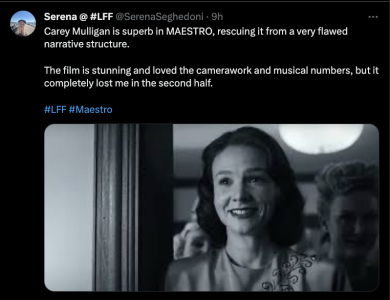“When I think about what makes a good story — a tale that traces out a plot and a path from A to B — the answers don’t always square with the parts of movies I love best.
“I’m not super hot on Bradley Cooper’s Leonard Bernstein biopic, Maestro, but the scenes in which Lenny conducts are magnificent and powerful, like being thrown into the middle of a sonic storm. The rest — the tortured-genius, bad-wife-guy intrigue — sometimes felt like homework. I often found myself thinking, ‘Let’s get back to the music.'” — from “When Did the Plot Become the Only Way to Judge a Movie?,” 10.8 N.Y. Times piece by Beatrice Loayza.

A recent Maestro conversation:
HE: “Emma Kiely’s Collider review of Maestro is totally in the tank for Carey Mulligan and that’s fine, but Kiely doesn’t even flirt with the possibility that Maestro might feel like weak tea to some. What is this review side-stepping? What about Cooper’s film that Kiely is being less than fully truthful about?”
Brooklyn Guy: “It’s the story of a marriage and a life between two people, one of whom just happens to be, in the view of many, one of the best composers and conductors of all time. [But the film suggests that] what Bernstein was doing with his life is just a coincidence. And yet without that, why should we even care about the marriage?
“In Michael Mann‘s Ferrari, the central couple (heterosexual) are business partners and that’s a crucial difference. There’s an actual conflict there. In Maestro the argument is over infidelity and drug use…nothing else. Bernstein’s politics? Nonexistent. Hers too. So it’s two-dimensional and complaint-driven, and yet it still manages to subscribe to a ‘great man’ theory of history.
HE: “Since Telluride I’ve been hearing that Mulligan’s big explosion-of-rage scene (while the Thanksgiving Day floats are moving past the apartment windows) is the keeper.”
Brooklyn Guy: “That’s about right.’
HE: “‘Non-existent’ politics alludes to the absence of the Tom Wolfe-chronicled Black Panther party (“Radical Chic: That Party at Lenny’s“).
Brooklyn Guy: “A filmmaker could go either way with that, either try to make an ass of Bernstein and yuck it up at Black people eating canapés that Tom Wolfe thought they were better suited to serve (do you think it’s a coincidence that Wolfe dressed like a plantation owner?) or they could give the Bernstein’s credit for making an effort but they go neither way.”
HE: “Wolfe’s Gatsby-esque garb was a throwback to the 1920s…he presented himself as half of a wisacre and half of a genteel Southern lad from Richmond.”












